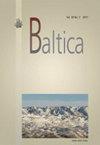基于测井解释的立陶宛西部下志留统页岩有机质分布及脆性指数评价
IF 0.6
4区 地球科学
Q4 GEOLOGY
引用次数: 0
摘要
人们对下志留统笔石黑色页岩的基本参数知之甚少,该页岩被认为是立陶宛西部最有前景的非常规气藏,位于波罗的海沉积盆地的中部深处。由于对油田的广泛勘探,在感兴趣的地区已经钻探了数百口深层油井。Llandovery中下段主要采用取芯钻探,而该段大部分仅采用测井覆盖。因此,对下志留系页岩主要参数的了解相当模糊,并且是基于稀缺的岩石样本数据。利用伽马射线、电阻率和声波测井,以及岩石样品的矿物学研究,记录有机物的垂直和横向分布。此外,脆性指数被定义为整个下志留系剖面的特征。发现了一些意想不到的趋势,这些趋势可能会改变立陶宛西部的勘探战略。矿物学研究和测井的综合应用表明,下志留系页岩的开采质量比以前认为的要高得多。测井资料表明,下志留系页岩中有机质含量和脆性较高。本文章由计算机程序翻译,如有差异,请以英文原文为准。
Distribution of organic matter and evaluation of brittleness index of the Lower Silurian shales of west Lithuania based on interpretation of well logs
There is little known of the basic parameters of the Lower Silurian graptolitic black shales that are considered the most prospective unconventional gas reservoir in west Lithuania, situated in the deep central part of the Baltic sedimentary basin. Hundreds of deep oil exploration wells have been drilled in the area of interest, owing to extensive exploration of oil fields. The lower and middle Llandovery interval was mainly drilled with coring, while most of the section was covered by only logging. Therefore, the knowledge of major parameters of the Lower Silurian shales is rather obscure and is based on scarce rock sample data. The gamma-ray, electrical resistivity and sonic logs were utilised, together with mineralogical studies of rock samples to document vertical and lateral distribution of organic matter. Also, the brittleness index was defined to characterise the whole Lower Silurian section. Some unexpected trends were identified that may redirect exploration strategy in west Lithuania. The combined application of mineralogical studies and well logs indicate a much higher exploitation quality of the Lower Silurian shales than previously believed. A higher organic matter content and brittleness were derived from logging data in the Lower Silurian shales.
求助全文
通过发布文献求助,成功后即可免费获取论文全文。
去求助
来源期刊

Baltica
地学-地质学
CiteScore
1.30
自引率
14.30%
发文量
6
审稿时长
>12 weeks
期刊介绍:
BALTICA is an international periodical journal on Earth sciences devoted to the Baltic countries region and the Baltic Sea problems. This edition as a Yearbook is established in 1961 by initiative of Academician Vytautas Gudelis. Since 1993, an Editor-in-Chief of the journal became Academician Algimantas Grigelis. BALTICA is published biannually (in June and December) in cooperation with geoscientists of the circum-Baltic States.
BALTICA is publishing original peer-reviewed papers of international interests on various Earth sciences issues. The particular emphasis is given to Quaternary geology, climate changes and development of ecosystems, palaeogeography, environmental geology, as well as stratigraphy, tectonics, sedimentology and surface processes with relevance to the geological history of the Baltic Sea and land areas. Journal emphasizes modern techniques, methodology and standards. The journal structure comprises original articles, short reviews, information, bibliography.
 求助内容:
求助内容: 应助结果提醒方式:
应助结果提醒方式:


